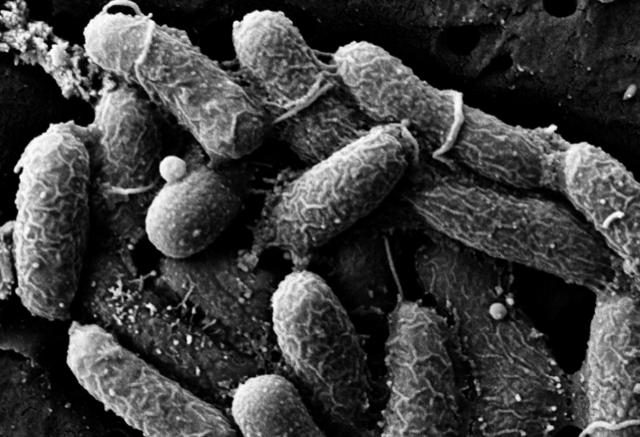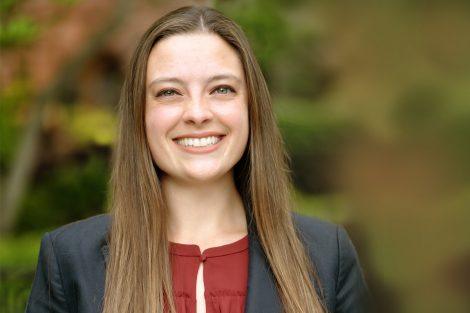Samantha Giffen, PhD ’21, loves the thrill of discovery, in the lab and beyond
May 6, 2021 – One day in 2014, Samantha Giffen sat in a small dark room at the New York State Department of Public Health’s Wadsworth Center, peering at the screen of a hulking electron microscope. She and a colleague had set up an experiment to test whether an antibody known as ZAC-3 would have any effect on Vibrio cholerae, the bacterium that causes cholera, a deadly diarrhoeal disease that afflicts millions of people in poor countries. As the image came into focus, Giffen could see that the bacteria’s outer membranes were crumpled and their tail-like flagella were coiled, signs that the antibody had vanquished the pathogen.
“It was so cool,” Giffen says, still sounding giddy about it. “I set the picture of the wrinkled bacteria as the background of my phone and had it there for like two years.”
In the years leading up to that moment, Giffen, who was working as a lab technician at the time, had made plenty of discoveries about science: that science is messy, that science is slow, that science is hard, that science is collaborative. But this was her first true scientific discovery and it filled her with a sense of achievement she’d never experienced.

It also propelled her deeper into the world of infectious disease research and led her to Harvard T.H. Chan School of Public Health, where she is finishing up her doctoral degree in the Program in Biological Sciences in Public Health.
Summer at the CDC
Growing up in central New Jersey, Giffen loved science and had a guilty pleasure for television shows about forensics and crime. When she learned that the Centers for Disease Control and Prevention (CDC) ran a Disease Detective Camp for high school students, it seemed like a dream come true. The immersive experience taught the then 17-year-old Giffen how epidemiological investigations unfold in the real world and instilled a newfound enthusiasm for public health, she says.
That enthusiasm led her to enroll as a public health major at the University of Massachusetts Amherst. A few weeks into the first semester, though, she realized that she was going to miss getting her hands dirty in wet labs, so she decided to double major and enrolled in the microbiology program.
“To be honest, as an undergrad, I didn’t entirely love public health and I didn’t entirely love microbio,” she says. “But what got me really excited were the things that sat right in the middle of the two fields—global infectious disease outbreaks, the challenges labs in low-resource settings face, that kind of stuff.” One summer as an undergrad she traveled to Manipal, India as part of a study abroad program and worked in a lab, studying the effect natural tomato extracts had on Candida, a common cause of fungal infections. After that, she did a summer program sponsored by the National Science Foundation in which she traveled to South Africa’s northern Limpopo Province to develop ceramic water filters.
With her undergrad studies coming to an end, Giffen wasn’t sure about her long-term career goals other than knowing she wanted to work in public health. What was clear, though, was that all roads ran through graduate school. But finding a doctoral program that could suit her dual passions wasn’t easy. “I have this very unique interest in public health and microbiology and there are very few PhD programs that sit at the intersection of both,” she says. “But Harvard has this super cool biological sciences in public health program that allows you to do basic science within the school of public health.”
A pandemic and a path forward
Giffen was well into working on her doctoral thesis on Mycobacterium tuberculosis—the pathogen that causes tuberculosis, a mostly respiratory disease that kills roughly 1.4 million people a year—when COVID-19 began its global assault. As the School pivoted to remote learning and temporarily shut its laboratories in March 2020, Giffen became intrigued by the prospect of working as a contact tracer to help monitor the spread of COVID-19 in Massachusetts and break chains of transmission.
“She really had something to offer in that moment. She understands the pathogen, she understands infectious diseases, and she is incredibly personable,” says Sarah Fortune, John LaPorte Given Professor of Immunology and Infectious Diseases, chair of the Department of Immunology and Infectious Diseases, and Giffen’s thesis advisor. “It’s not the normal course of action for someone to step out of their thesis work and take on a side job. But this was an incredible moment, and it was an incredible opportunity for her to serve her community in a way that she loves.”
Giffen spent six months working as a contact tracer, making hundreds of phone calls to people who had been potentially exposed to someone sick with COVID-19. It was a delicate situation and people’s responses ranged from gracious to volcanic. “I loved it, but it was hard,” she says. “I was literally doing the investigative interview that I learned about as a teenager at the CDC’s detective camp, so everything came full circle. And I think that experience will help make me a better public health leader.”
This June, Giffen will defend her thesis, a study of a protein called WhiB2, which regulates the process of cell division in M. tuberculosis and could be a potential therapeutic target. After that, she’ll start a fellowship in clinical microbiology that’s intended to train clinical laboratory directors. As Fortune explains, it’s a job that serves at the intersection of basic science and clinical care. One day a clinical lab director might be retooling population-level diagnostic strategies, and the next day they might be sounding the alarm over a handful of unexplained respiratory infections or the discovery of a drug-resistant pathogen.
“In a lot of ways, the role of a clinical lab director is the complete opposite of a PhD. During a PhD, you usually become an expert on a very narrow subject, but as a clinical lab director you have to know a little bit about everything—viruses, parasites, funguses, bacteria,” Giffen says enthusiastically.
It’s a career path that will demand plenty of scientific sleuthing—and one that seems uniquely suited for Giffen.
photos courtesy of Samantha Giffen
